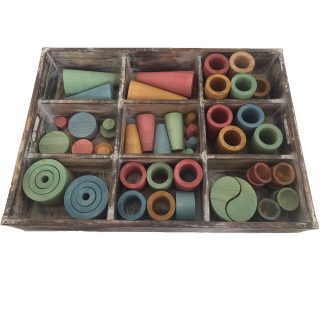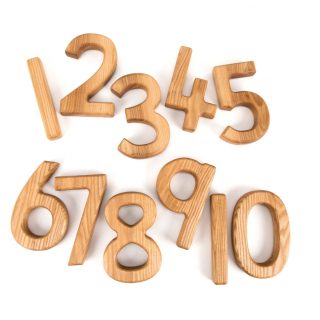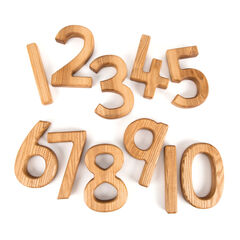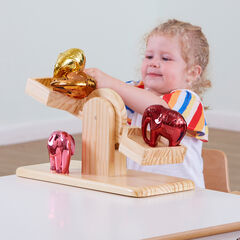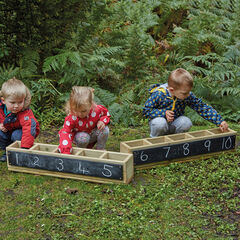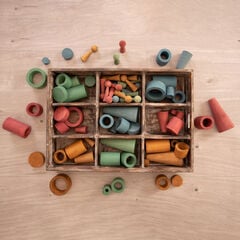This series of articles has been written by industry experts to help you to understand changes to the EYFS Framework. In this blog, Early Years consultant Alistair Bryce-Clegg looks at the Mathematics area of the framework.
Developing a strong grounding in number is essential so that all children develop the necessary building blocks to excel mathematically. Children should be able to count confidently, develop a deep understanding of the numbers to 10, the relationships between numbers and the patterns within those numbers. By providing frequent and varied opportunities to build and apply this understanding – such as using manipulatives, including small pebbles and tens frames for organising counting – children will develop a secure base of knowledge and vocabulary, from which mastery of mathematics is built. In addition, it is important that the curriculum includes rich opportunities for children to develop their spatial reasoning skills across all areas of mathematics. This includes shape, space and measure.
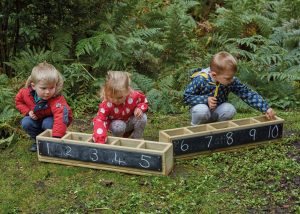
It is important that children develop a positive attitude and interest in mathematics. They should look for patterns and relationships, spot connections, ‘have a go’, talk to adults and peers about what they notice. Also, they should not be afraid to make mistakes.
Number is everywhere around us and a very accessible teaching point.
Number is usually the aspect of mathematics that features most in an Early Years space. We spend a great deal of our time counting and talking about number value. Everything from ‘Five Little Speckled Frogs’ to how many apples we need for snack time. Number is everywhere around us and a very accessible teaching point.
The Revised Framework has split what was ‘Numbers’ into ‘Number’ and ‘Numerical Patterns’. There is often an emphasis in Early Years on children’s ability to recognise and record their numbers. However, this is not a feature of the new Early Learning Goals for Mathematics. There is a much greater focus on children understanding the concept of a number, what it is, how it is made and how it can be represented. The Early Years environment should offer rich opportunities for children to be able to count, sort, arrange, make sets etc. Whether this is through construction, transient art, a creative area, woodwork, small world – the list goes on.
There is now the expectation that children will be able to subitise. That is recognise how many objects, up to 5, without counting. Also, they should be able to automatically recall number bonds to 5, and some to 10, without the use of counting, rhymes, or other aids. This means that they can’t use their fingers! I think a lot of adults I know (me included) might struggle with that one! The message is that children who have a clear understanding of the concept of number, have a more secure grounding in mathematics.
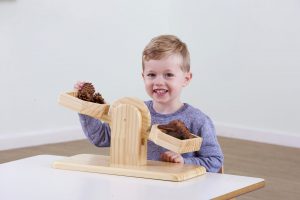
It is not like we can ignore it – shape, space and measure are everywhere.
Play-based learning and effective continuous provision are a brilliant way of making all of the above part of children’s everyday experience. When considering the provision for mathematics in your space, make sure you evaluate the effectiveness of opportunities you have created. Not just in terms of if the children are in the space, but also what it is they are doing. I see lots of maths areas in Early Years spaces that are empty. That or they are full of children who are not doing the maths ‘task’ or ‘activity’ that has been provided. If we can think about the concepts of mathematics that children need to develop in the Early Years and make them part of provision, rather than a standalone area, then maths becomes integral to play and learning.
Although shape, space and measure no longer feature in the Early Learning Goals they are still represented in the Educational Programmes. They should still be part of the mathematical experiences that we are offering children. I mean, it is not like we can ignore it – shape, space and measure are everywhere.
Shop Mathematics resources here.
Interested in finding out more about the changes to the EYFS framework?
Click on the links below to read our other articles from Alistair Bryce-Clegg …
Thank you to Early Years consultant and expert Alistair Bryce-Clegg for the content in this blog.


